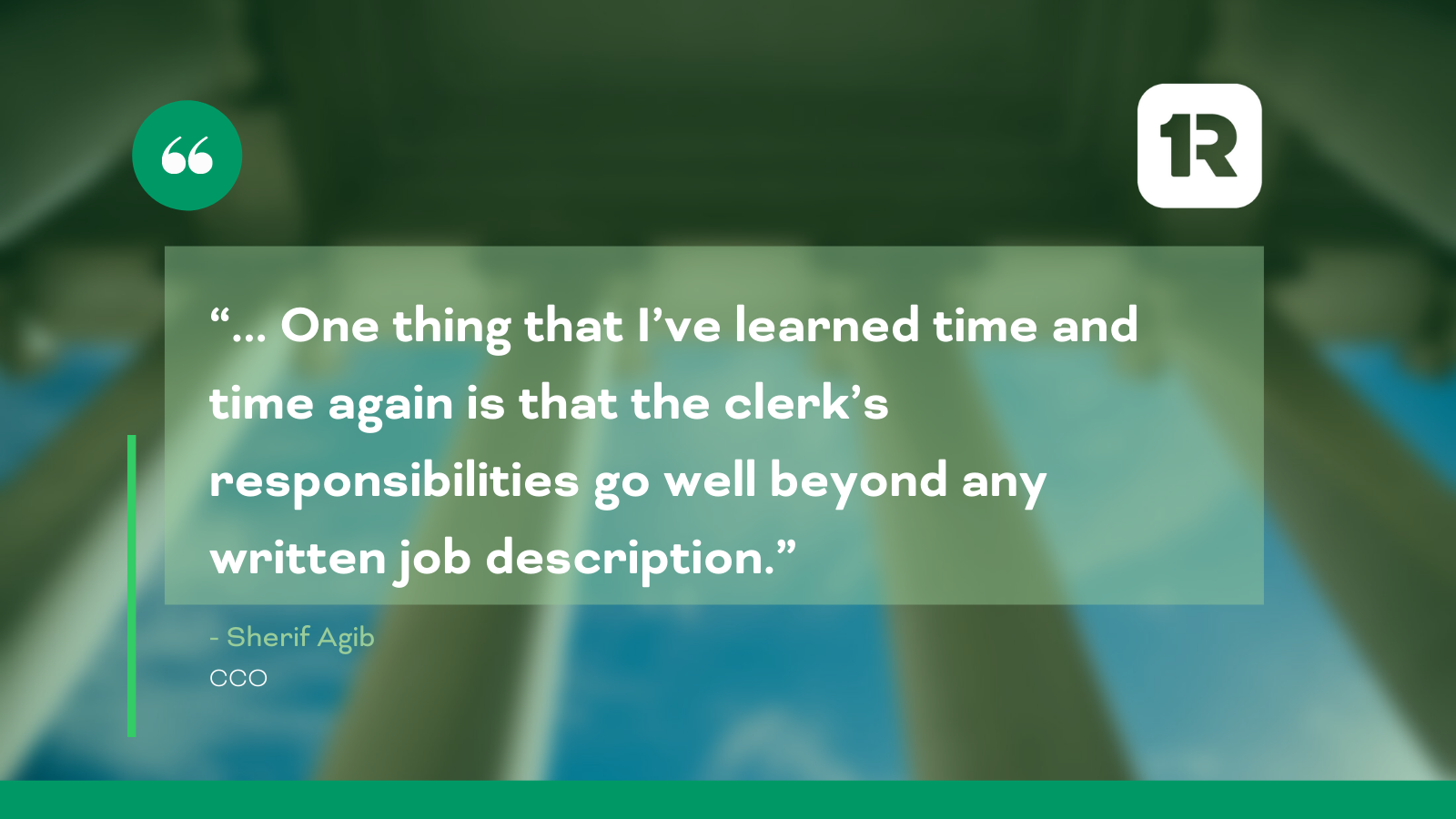I’ve had the good fortune to work with city and county clerks for over a decade and one thing that I’ve learned time and time again is that the clerk’s responsibilities go well beyond any written job description.
But before unraveling our understanding of everything the municipal clerk is involved in, we must start with a widely accepted definition. The City Clerks Association of California (CCAC) provides a great overview of the role:
“The City Clerk is the local official for elections, local legislation, the Public Records Act, the Political Reform Act, and the Brown Act (open meeting laws). Before and after the City Council takes action, the City Clerk ensures that actions are in compliance with all federal, state, and local statutes and regulations and that all actions are properly executed, recorded, and archived.
The Office of the City Clerk is a service department within the municipal government upon which the City Council, all City departments, and the general public rely for information regarding the operations and legislative history of the City. The City Clerk serves as the liaison between the public and City Council and provides related municipal services.”
This synopsis gives us the opportunity to investigate these areas and helps us to better assess the clerk’s role in the public process.
City/County Council Meeting Management
As a local government partner who focuses on agenda and minutes solutions, this is an area where I witness the clerk’s duties going well beyond the stated responsibilities. Clerks are in charge of the preparation of meeting agendas, the recording of meeting minutes and proceedings, and the finalization and publication of the minutes and supporting packet material as well as the management of maintaining the legislative history of these meetings.
What individuals may not know is while the description above paints a good summary, there is always a flurry of action behind the scenes to facilitate meeting preparation and finalization. The clerk’s department has to ensure that each step of the item approval process is done in a consistent and timely fashion. The clerk is bound by a professional code of ethics to ensure that record keeping is accurate and timely, even when it falls on other governmental departments to complete those actions. Once each step has been reviewed and recorded to finalize an agenda, it is the responsibility of the clerk to finalize that content into a consolidated record for meeting discussion.
Then, there is the minutes process during the meeting. The clerk’s responsibility is to ensure all discussions between the council members, the public, and other speakers and all vote records are accurately represented and recorded. This is an essential part of fulfilling the core responsibility of preserving public and historic record information. Given the high speed of meetings, the shifting nature of discussions, inconsistent public speaking volume, votes tabled, and so on, recording minutes (and the accuracy of those minutes, more importantly) requires a special talent and ability.
Finally, there is the publication of meeting minutes. As part of the responsibilities of the clerk, the preservation and protection of the public record is at the core of those responsibilities, which requires the clerk and their staff to provide public information of these proceedings. The process of reviewing the recordings, updating the minutes for accuracy, and finalizing all data can be extensive and time-consuming — albeit necessary — work.
Additional Responsibilities
After reading the responsibilities mentioned above, most people would think that they would suffice, but there is more. In addition to the management of meetings and public information relating to meetings, the clerk manages a litany of other areas, including: public records request of information, elections, budget management, software implementations, appointments of city boards and commissions, notary services, business license submission, facilitation of ethics training for council and committee members… I could go on and on. It takes a special set of management and organizational skills to take on the role of clerk and all its written and unwritten duties and obligations.
Understanding Leads to Trust
In PrimeGov’s over 20 years of experience working with municipal clerks, we have learned that the clerk’s role goes well beyond the written job description. The individuals we have worked with over the years demonstrate a high level of versatility because it is a tacit requirement for success. The municipal clerk must bring skills such as attention to detail, multi-tasking ability, innovation, and composure under pressure to their work every day. And as someone who has worked in the private sector throughout my career — and has hired for countless positions — I can attest that finding someone who fits all these criteria does not come easy.
In a recent white paper conducted by PrimeGov, respondents rated the overall satisfaction of their current legislative management software as a 5.6 out of 10. Obviously, this is a failing grade, but as I reflected on the time I’ve spent over the years working with municipal clerks, I realized the correlation between the clerk’s responsibilities and this response makes quite a bit of sense.
When we realize just how many responsibilities and duties fall on the clerk’s shoulders, we can see how the need for the software to align to those demands has not been met over the years. To understand the development of good software for the clerk, one must first know exactly what the clerk goes through on a daily basis. The key here is versatility, but also simplicity. A legislative management solution needs to provide a clerk with the versatility to adapt as changes happen in legislation. It also needs to provide simple actions to allow for those changes to meet required deadlines and public information guidelines.
Providing a solution for the demanding duties of the municipal clerk starts with first unraveling and understanding the role, then offering software that has the versatility and simplicity needed to take necessary action. The last but very necessary piece to this puzzle is the trusted and reliable partner for municipal clerks to rely on. Part of the decision in purchasing the right software solution is also the extended team a municipal clerk will rely on. Any clerk will tell you that success in their role depends on the great team they have surrounded themselves with. The software vendor providing a clerk’s solution should be no different. A purchase of a solution is a solution in and of itself: it is the collective effort provided by software and people. In order to solve for the complexities of the municipal clerk’s responsibilities, trusted partners must provide both software and service successfully.
- Sherif Agib


